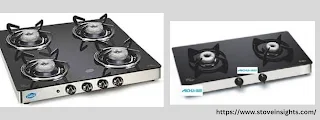Aluminum Burners
Aluminum burners are widely used in modern gas stoves due to their affordability and efficient heat conduction. Let's delve into the specifics of aluminum burners.
Advantages of Aluminum Burners
Cost-Effective: Aluminum burners are generally less expensive compared to brass burners. This makes them popular for budget-conscious consumers who still want a reliable and efficient cooking experience.
Lightweight: Aluminum is lightweight, making the burners easy to handle and install. This can be particularly beneficial for portable or compact gas stoves.
Good Heat Conduction: Aluminum is an excellent heat conductor, ensuring even heat distribution across the cooking surface. This results in faster cooking times and more consistent cooking results.
Corrosion Resistance: Aluminum naturally forms a protective oxide layer that prevents corrosion, enhancing the durability of the burners in various cooking environments.
Disadvantages of Aluminum Burners
Lower Durability: While aluminum is corrosion-resistant, it is not as durable as brass. Aluminum burners can wear out faster, especially with frequent use and exposure to high temperatures.
Susceptible to Warping: Aluminum burners can warp over time due to prolonged exposure to high heat. This warping can affect the burner's performance and longevity.
Less Aesthetic Appeal: Aluminum burners may lack the aesthetic appeal of brass burners. They often have a simpler and more utilitarian look, which might not be desirable for those seeking a more elegant kitchen appearance.
Brass Burners
Brass burners have been a staple in traditional and modern kitchens for their durability and excellent performance. Let's explore the specifics of brass burners.
Advantages of Brass Burners
High Durability: Brass is a robust and durable material, capable of withstanding high temperatures and heavy use. Brass burners have a longer lifespan compared to aluminum burners.
Better Heat Retention: Brass burners retain heat longer than aluminum burners, ensuring consistent heat output and better cooking performance over extended periods.
Aesthetic Appeal: Brass burners often have a polished and attractive appearance, adding a touch of elegance to the kitchen. This can be particularly appealing for those who value aesthetics in their kitchen appliances.
Corrosion Resistance: Brass is highly resistant to corrosion, making it suitable for use in various cooking environments, including those with high humidity.
Disadvantages of Brass Burners
Higher Cost: Brass burners are generally more expensive than aluminum burners. The higher cost can be a deterrent for budget-conscious consumers.
Heavier Weight: Brass is a heavier material compared to aluminum. This can make brass burners more challenging to handle and install, especially in portable or compact gas stoves.
Maintenance: Brass burners require regular cleaning and maintenance to keep them looking their best and functioning optimally. Over time, brass can develop a patina that may need polishing to maintain its appearance.
Factors to Consider When Choosing Between Aluminum and Brass Burners
When deciding between aluminum and brass burners for your gas stove, several factors should be considered to ensure you make the best choice for your needs.
Cooking Style and Frequency
Your cooking style and frequency play a significant role in determining the best burner material for your gas stove. If you cook frequently and require a burner that can withstand high temperatures and heavy use, a brass burner might be the better choice due to its durability and heat retention properties. On the other hand, if you cook occasionally and are looking for a cost-effective option, an aluminum burner might suffice.
Budget
Budget is a crucial factor when choosing between aluminum and brass burners. Aluminum burners are more affordable, making them an attractive option for those on a tight budget. However, if you can afford the higher upfront cost, investing in a brass burner can pay off in the long run due to its longevity and superior performance.
Aesthetic Preferences
If the appearance of your kitchen appliances is important to you, brass burners might be the preferred choice. Their polished and elegant look can enhance the overall aesthetics of your kitchen. Aluminum burners, while functional, may not provide the same level of visual appeal.
Maintenance and Care
Consider the level of maintenance and care you are willing to invest in your gas stove burners. Brass burners require regular cleaning and polishing to maintain their appearance and performance. If you prefer a low-maintenance option, aluminum burners, with their natural corrosion resistance, might be more suitable.
Conclusion
Both aluminum and brass burners have their unique advantages and disadvantages, making them suitable for different needs and preferences. Aluminum burners are cost-effective, lightweight, and excellent heat conductors, making them ideal for budget-conscious consumers and those who cook less frequently. However, they may lack the durability and aesthetic appeal of brass burners.
Brass burners, on the other hand, are highly durable, retain heat well, and have an attractive appearance. They are suitable for frequent cooks who require reliable performance and are willing to invest in a higher upfront cost. However, they are heavier and require regular maintenance to keep them looking and functioning their best.
Ultimately, the choice between aluminum and brass burners comes down to your specific needs, budget, and preferences. By considering the factors discussed in this blog, you can make an informed decision and choose the burner that best suits your gas stove and cooking style.






No comments:
Post a Comment